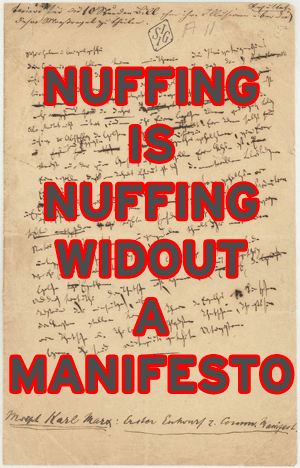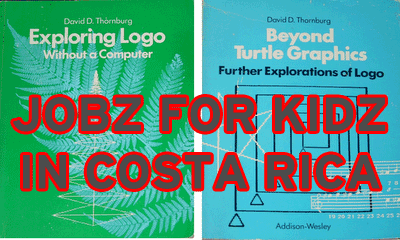Wow, what a gripping read from Gary Stager on the history of Logo and that of the web, and yet, how utterly disappointing that he follows it up with what is, unfortunately, best described as an absolute pile of crap.
I should redirect you at this point to a much more detailed (and considered) response from Stephen – but if you’re into name-calling and silly pictures (with poor lulz)… read on :D
And should I say, first up, that I actually don’t have any real concerns about teachers not picking up on using social software because a. they are, and b. plenty don’t need to.
Stager basically whinges about web 2.0 tools saying, looking at them in comparison with Logo.
- The Web 2.0 tools promoted by Warlick and Utecht were not created by educators or for children. Educators hope to find educational applications despite having almost no input into the development of future tools.
LOL – Moodle, Elgg, etc. etc. However… hang on, this devalues email, and, come to think of it chairs and desks… and what’s this paper stuff! To discount a technology (even a little bit) because it has no explicit ‘educational’ input is nonsense. Besides which, the very foundations of social software, could, arguably, be placed in education.
- The Web 2.0 tools come out of corporate, not academic, cultures with very different motives.

It is hereby written that anyone who is not a non-profit or academic is without genuine value. Oh fer fricks sake this is just petty. I can promise you one thing, if these tools were being developed in academic contexts… odds are, they wouldn’t be!!!
- There is no educational philosophy inspiring the development of the Web 2.0 tools or their use.
Absolute nonsense, ‘development’ is always hard to define but in terms of ‘use’ are you for real?
Apparently, the main issue with the above is that (to jump ahead a little) “there is no educational theory on which the tools are designed” and “no critically acclaimed or even popular manifesto”. I might suggest that to insist on a manifesto for tools or the design of them – is almost as ridiculous as to insist on a manifesto for school buildings (OK , go on and Christopher Alexander me) – but more importantly, are we not a little beyond a manifestor driven society, are not most of our beliefs informed by far more than they once were, has not… oh sod it, here’s a picture:

- Although a principle of the Web is the democratiziation of knowledge, this is an abstract concept to educators raised on textbooks and being commanded to recite from scripted lesson plans.
Hmmmm… I don’t know that many educators who do that. But talk about a nonsensical straw man, where’s this ‘democratiziation of knowledge’ come from, who’s holding this up as a fundamental principle and what on earth has it to do with pedagogy?
- The greater Web 2.0 community has little interest in reforming education.
Actually that’s not true, they want to make a lot of money out of doing just that :) Seriously though, you complain about people being un-academic and then produce the broadest, most unjustified generalisation I’ve seen all week (and that’s saying something).
- Web 2.0 attracts very little interest in the educational psychology or even teacher education communities.
Hahahahahahahahahaha I reckon over 50% of higher ed based educational technologists have a background in edu psychology (from my experience, more) and as for teacher ed communities… you can’t belong to that many.
- There exists very little peer-reviewed scholarship regarding Web 2.0. In fact, many people in the blogosphere are openly contemptuous of theory and scholarship in favor of “the wisdom of crowds,” a new and popular, albeit inherently anti-intellectual world-view.
Evidently you could do with reading TWOC first, before knocking it. And there exists a massive amount of peer reviewed scholarship. And ‘openly contemptuous of theory and scholarship’ – are you for frickin’ real??? ‘Openly contemptuous’ of you, perhaps ;)
- By definition, the Web 2.0 community is leaderless. Too often, non-equivalent opinions are given equal weight without a demand for evidence or supporting arguments.
Just out of interest, who leads the ‘education’ community? And how often are ‘non-equivalent opinions’ given weight within it :D
- There is very little material written for educators on using Web 2.0 tools in a creative fashion. Will Richardson’s book is a fabulous resource for understanding the read/write web, but hardly offers provocative project ideas.
Ahhhh… you want some lesson plans, now I see where your earlier point is coming from.
But realistically, there is a great deal of material available – on the web surprisingly enough – on how to effectively use communication tools in PBL, TBL or any number of other ‘creative fashions’. Perhaps your perceived ‘lack’ might be down to the fact that these tools don’t need manuals, or indeed dictate the way in which they are used in any more sense than, say, a telephone might.
- No matter how cool, powerful or revolutionary Web 2.0 tools happen to be, there are few if any mature objects-to-think-with embedded in them and certainly no explicit statement that their use is designed to transform the learning environment.
WTF is an ‘object-to-think-with’?
- The emphasis on information reinforces passive pedagogical practices, whether intentional or not.
Do you have the faintest idea about what social software is, about how it’s changing our dependence on information? Sorry, this makes me think you don’t actually know what you’re talking about.
- I know I’ll get flamed for this, but the educational Web 2.0 community has little first-hand experience in social activism and scant knowledge of existing school reform literature….

Scant knowledge… bunch of dills… rather. We know nothing, never even read a book me, just on myspace most times.
Oh, I can hardly bear to go on… in fact I can’t, so I’ll finish here, except to say that that such an interesting overview of a slice of ed tech history has rarely, if ever, been followed by such a reactionary, limited and incomplete ivory-towered, condescending and ill-informed argument (if you can call it that).
Return to your Logo, your education technology as it should be – designed, lead and owned by academics and people (surprising this is!) like you dear self.
Heck, you might even fill a few more factories ;)








